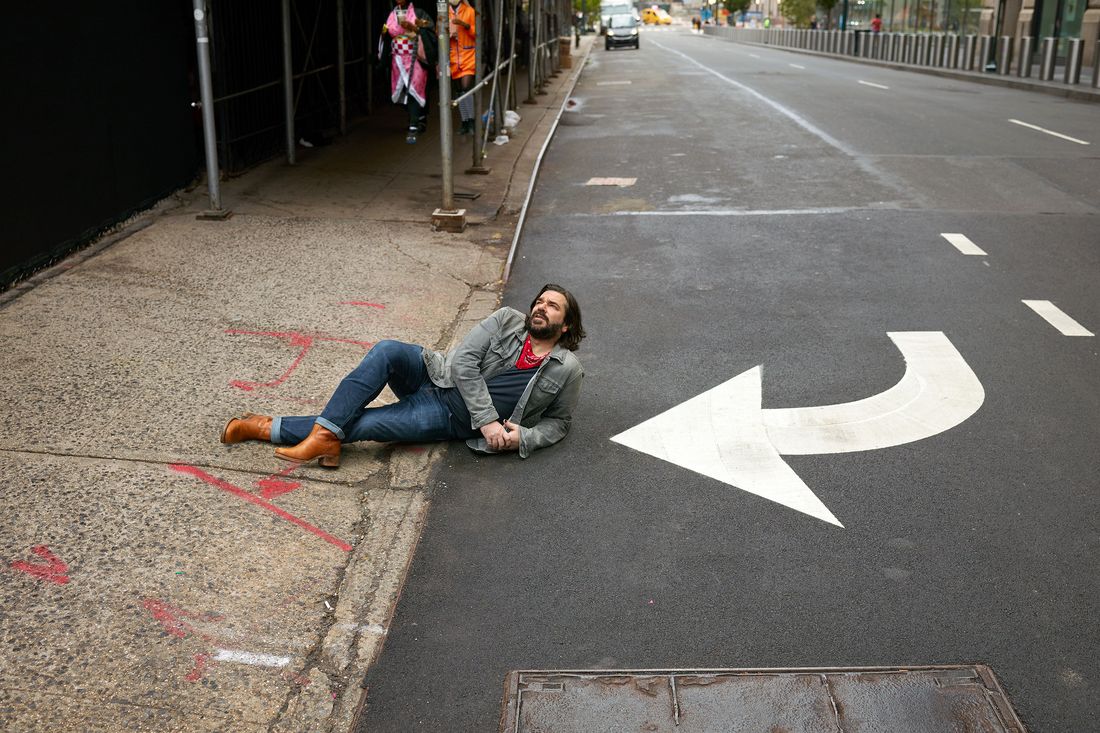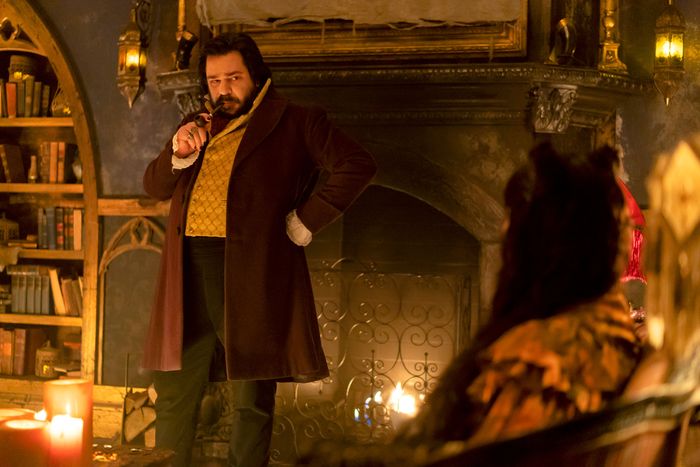
Matt Berry plays men who do not fit in this world, who are either too dumb to know that or too self-involved to care. He’s the cruel, fatuous hangman — also named Matt Berry — in Snuff Box and the witless, talentless actor Steven Toast in Toast of London. In FX’s What We Do in the Shadows, he’s a sex-obsessed, murderous Victorian vampire who is absolutely serious at all times, especially when he’s being very stupid. “Escapism is so important,” Berry tells me at a plush hotel bar in Manhattan, where he’s attending Comic Con to promote the third season of Shadows. “I’m more than happy to be part of something that is utterly pointless and stupid. With no sort of social hammer whatsoever. Nothing at all.”
It’s true — much of Berry’s work is superficially goofy, full of big silly gags and juvenile jokes about sex. Claiming that as his entire appeal doesn’t fully capture what makes Berry such a compelling performer, though. All of his roles, many of which he writes himself, have an instantly distinctive quality: the utter commitment of buffoonery played straight with the occasional flourish of strange, elongated vowels that can turn any word into a hilarious oddity. He plays these imbeciles with so much unblinking stolidity you can’t help but search for a hint of knowingness, some sign that he’s winking. You know there’s a smirk, but you’re not sure how you know it because Berry betrays nothing. He’s not trying to convince anyone he’s being funny.
Berry is not tall, and in life he is much quieter and more reserved than his noisy screen roles. But there is a familiar intensity, especially in his dark, deep-set eyes. He is sitting on a dusky-pink sofa and wearing a denim jacket, red bandanna, black T-shirt, and jeans. His fingernails are painted black; the polish is chipped. This bar has try-hard polka dots on the walls and gives the impression that it would love to be photographed. The actor creates the opposite feeling, and he tells me that if I look back on this interview and decide there’s nothing worth writing about, I should feel free to just skip the whole thing. “When actors, people that are an extension or an exaggeration of themselves in their performances, do a lot of interviews, you’re not left with much at the end of it,” he tells me with a shrug.
Berry is not a household name, especially in the U.S. In part, that’s because he is so reluctant to make the U.K. panel-show circuit, to participate in the fame shortcuts that would help launch him to leading-man stardom. In the U.K., he thinks, it is still possible to be a little standoffish if someone’s work doesn’t aim for broad appeal. If he were more ubiquitous, there would be more pressure to fit a particular mold. “And I wouldn’t be able to continue to do what I want,” he says.
His onscreen personae are funny, but they are people who rarely laugh. Berry does sometimes, in an almost giggly way. He is looser than his characters and more considerate. Director Yana Gorskaya says that when things go awry on the set of Shadows, Berry sends her silly voice memos to cheer her up. Susan Wokoma, his co-star in Year of the Rabbit, says his routine on set was singing Destiny’s Child’s “Say My Name,” and is effusive about Berry as a colleague. “You know when you meet people who are fascinating, but who are actually just a knob-end? He’s not that,” Wokoma says. “God, he’s gonna love this,” Wokoma laughs, knowing that the very private Berry would find the praise slightly mortifying.
He is easy to talk with, yet even after a few hours in his company, it’s difficult to get used to the quality of his voice. It can sound so resonant it’s hard to believe there’s no microphone or instrument hidden somewhere on his person. The voice is part of why Jemaine Clement, who produced Shadows as a movie in 2014 and later adapted it into a TV series, created the character of Laszlo Cravensworth for Berry. “Some things I feel are only funny if he says it,” Clement says. Fred Armisen, who cast Berry in a 2013 Portlandia sketch as a children’s musician, describes the voice as “serious with something funny underneath.” Berry’s longtime friend and colleague Morgana Robinson says his voice belongs to “a thespian bear.” “Cigars, whiskey, open fire, Shakespeare, but all in the shape of a big hairy bear,” Robinson says. “It’s like a roast dinner.” Jon Hamm, whom Berry cast in a Toast of London episode in 2015, points to it as key to Berry’s persona. “It demands attention,” Hamm says. “And then a part of that is to then say, while I have everyone’s attention” — Hamm imitates Berry — “ ‘Well, I don’t care!’ ”
Berry grew up in a small English town called Bromham; his father drove a taxi, and his mother was a nurse. In school, as Berry puts it, he was “an underachiever.” He was only ever drawn to the arts. One Christmas, when he was around 12, his parents surprised him by putting a small old-fashioned organ in his bedroom. “That’s all I needed,” he says. “My whole world was this thing, singing along to it.”
He started writing music and has continued to write and perform throughout his career, recording nine studio albums and the soundtracks for many of the television shows he has produced. He got a degree in contemporary art from Nottingham Trent University, where he began painting and continued to study music. Not until he moved to London after college did he start acting — not on a traditional stage but as a performer in the London Dungeon, a tourist attraction where actors portray terrifying scenes from British history. His friend sold him on the job as an easy gig, something he could do even if he turned up hung-over in the morning. Makeup, after all, hides a lot. “You just had to convey this historical stuff to these people in the scariest way that you could in costume,” Berry says. “And you had free run. I used to try all sorts of things. And that’s where the timing and all that came from, because you had a show every 15 minutes all day, all week.” He spent two years in the Dungeon. “You learn so much by doing those kinds of jobs,” he says. “You learn that stillness can be your best weapon.”
By the early aughts (Berry prefers not to look back on his work and insists he has no memory of exact dates), the comedian Noel Fielding (“a friend of a friend”) invited Berry to perform at “a thing called The Boosh above a pub in North London.” The Mighty Boosh, which would later become a BBC-TV series and launch Fielding’s career, was a surrealist live comedy performance, and Berry was asked to be a warm-up musician before the show. He decided that straightforward didn’t fit the mood. “I sussed the night and the space,” he says. “Thought, Well, no, I’ve got to do something else. So I did one as a guy who was a young, earnest singer-songwriter who took enough pills to kill himself at the beginning of his song.” He had another bit in which the singer assumed a confessional mode, telling the audience where all his victims’ bodies were buried with lyrics taken verbatim from serial killers’ confessions. “The thing that attracted me was getting the audience to assume I would sing some songs and that would be it. And then I would fuck with it,” Berry says.
Berry’s connection with the Boosh crowd was the launchpad for his career as an actor and a writer. He was cast in Matthew Holness and fellow Boosh collaborator Richard Ayoade’s 2004 series Garth Marenghi’s Darkplace, and he co-created the 2006 show Snuff Box with another Boosh participant, Rich Fulcher. He began doing voice-over work for animated series and commercials. (Voice-overs get old, Berry says, “but I’m not moaning about it. It’s paid for lots of things.”) He had a prominent, recurring role on the British show The IT Crowd, the most mainstream comedy Berry had appeared in up to that point. I ask about his feelings regarding a 2008 episode that has become a political flash point in the U.K., in which Berry’s character enjoys dating a woman, discovers she is trans, and breaks up with her because of it. At the end, they become involved in a violent fight, designed to depict the trans woman as masculine. Berry swiftly notes that he did not write the episode and was only a guest performer on it. (The writer, Graham Linehan, has since become an outspoken member of a virulent anti-trans-rights movement in the U.K.) It is the only time in our conversation when Berry seems uncertain. The episode looks “ridiculous and dated” now, he says, and he hopes people can accept that it was a product of an earlier time. He comes back to the idea later as we’re getting ready to leave. It bothers him that he wasn’t clear: “I don’t condone anything that that comedy portrayed, you know? I don’t share any views that the writer has.”
This is the other risk of becoming too famous, though Berry doesn’t articulate it this way. How people read your past performances starts to matter, and some viewers may misinterpret your role as a clueless idiot and assume you are too. You start to be, as Berry puts it, “property of everyone,” accessible to both the fans who get it and the ones who deliberately or unintentionally misconstrue your work. He considers it with a touch of frustration. “If I play a part in something, that isn’t me,” he says. “In Snuff Box, I was a hangman, and I couldn’t be more anti–capital punishment.”
By 2012, Berry was well known enough in the U.K. to briefly appear in the London Olympics’ closing ceremonies and to sell a TV series called Toast of London to Channel 4. (He shot a six-episode spinoff this year called Toast of Tinseltown, which takes the show to Los Angeles.) He stars as Steven Toast, an actor who longs for national recognition, cannot understand why he’s not rich and famous, gets mired in petty rivalries, eventually burns down the Globe Theatre, and supports his faltering career with, yes, voice-over work. The show is full of absurd names: Clem Fandango, Varrity Map, Clancy Moped, Heathcote Pursuit. The names, Berry says, are owed to “quite a weird form of dyslexia” in which any word he doesn’t immediately recognize turns into something else. Many of them are his brain’s initial misreadings. Maybe, I suggest, having a weird form of dyslexia played some role in that early presumption that he was an academic underachiever? “Yeah,” he says, “but it’s worked in my favor. If it hadn’t been for that, I wouldn’t have come up with these names.”
Toast wallows in the precise outlook Berry abhors. “He says, ‘Why haven’t I got my own this, that, and the other? Why aren’t I more famous now? Why don’t I have that? Why am I so unlucky?’ ” Berry says. “It’s easy to write because I see it in other people.” What would happen, I wonder, if Berry were offered a part in a high-visibility project that actually appealed to him? “That would be a conundrum,” he says. “Because, then, shit.”
"type" - Google News
October 25, 2021 at 02:13PM
https://ift.tt/2ZusAlP
Matt Berry Has a Type - Vulture
"type" - Google News
https://ift.tt/2WhN8Zg
https://ift.tt/2YrjQdq
Bagikan Berita Ini















0 Response to "Matt Berry Has a Type - Vulture"
Post a Comment